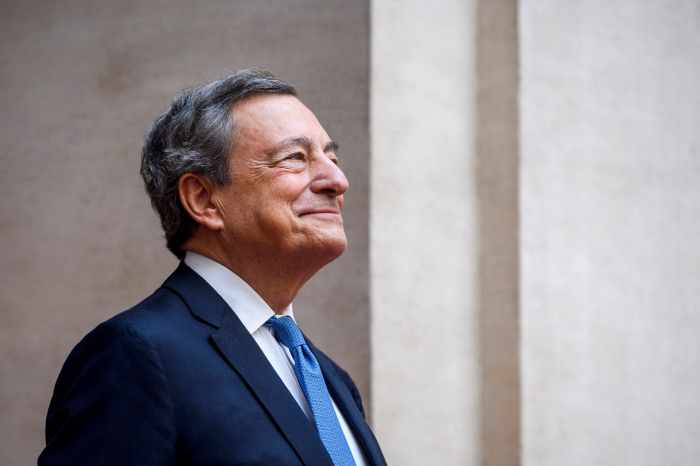Like Gorbachev’s Perestroika, the report from the former ECB chief could herald a change of historic proportions. It’s far less innocuous than it sounds.
For most of the past year, the big brain of Mario Draghi — Europe’s supreme technocrat — has been holed up in Brussels at the behest of European Commission President Ursula von der Leyen, drafting an innocuous-sounding document.
On the face of it, the so-called competitiveness report, due out Monday, is a broad study on what ails the economy and how the European single market must adapt to navigate a more complicated geopolitical landscape plagued by subsidy wars, tariffs and sanctions.
And yet, clues point toward the report being much more than just another bureaucratic exercise. Something more akin, perhaps, to a grand restructuring in the spirit of the Soviet era’s Perestroika or America’s post-World War II New Deal.
For one, there’s the relative secrecy with which Draghi — the Italian who famously saved the euro from the brink as European Central Bank president in 2012 by uttering he was prepared to do “whatever it takes” — has approached the task.
Striking too was that only a single sliver of the report, pertaining to defense, has leaked to date — as POLITICO scooped.
Cooperating with only a handful of policymakers and chief economists from different directorates, like some kind of Brussels-based Manhattan Project, Draghi’s small secretariat at the Commission has made few efforts to consult with wider civil society groups. Many such groups have fretted about the lack of transparency and opportunity for feedback — and what this could entail for their sectors.
Then there’s the external nature of the forces, mostly out of the bureaucrats’ control, contributing to Europe’s current great stagnation.
Yes, there have been previous attempts to rethink key economic and industrial structures that underpin the EU — most recently with the 2019 Juncker plan for investment and Draghi’s own efforts in 2012 to restructure Europe’s broken economy in the aftermath of the sovereign debt crisis.
But none of those approaches had to contend with the burdens of waning globalization, growing protectionism, the energy transition and a rising rejection of old free-market norms. All this as financial markets become poised to consider a new multipolar order.
No longer is the restructuring task facing Europe centered merely on fine tuning the manner in which its core economic vision is implemented. Today, the bloc faces a reality it was never prepared for ― one where energy is no longer cheap, security can no longer be guaranteed, and where existing terms of economic engagement break down to the point that the only way to guard against Chinese competition is, perhaps, to become more like China and thus more interventionist.
Add to that how Europe’s economic structure has been involuntarily transformed over the past half-decade. First with the loss of the United Kingdom and its financial might in the EU because of Brexit, then under the spending strains of the Covid-19 pandemic, and finally with the blow of German deindustrialization due to the fallout from the Ukraine war that severed Europe’s manufacturing hub from access to plentiful Russian gas. On the horizon, too, is the question of how Ukraine’s massive agricultural heft will be seamlessly integrated into the system.
Given all that, restructuring of historic proportions might well be in order — as significant, some say, as those of the Davignon report of 1970 that helped guide the European Economic Community away from its original steel and coal dependencies.
This time, to maintain competitiveness, it is Europe’s most energy-intensive industries that will either have to be shuttered outright or relocated to areas serviced by comparatively cheaper energy sources. Analysts point to the north, which benefits from hydropower, or the south, where solar is abundant — or even to France to take advantage of the country’s nuclear power stock. Where that leaves Germany nobody can be certain.
In the runup to publication we've known little about Draghi’s thinking, or even if the plans require a new EU treaty. But what’s certain is that to move things along, the statesman will have to placate two competing influence groups in Brussels: The more mercantilist sort, who see logic in reviving economic nationalism; and those still committed to the integrated liberal foundations behind the EU project’s raison d’etre.
As the ultimate technocrat, it’s likely that in the end Draghi will strive to balance the pros and cons of both worlds, while defending his choices with data. Yet, given the urgency of the challenge and the top-down decision-making involved, it’s inevitable he will upset some more than others.
After all, no great restructurings have managed to please everyone.
Izabella Kaminska is senior finance editor at POLITICO Europe.
More about:
















































